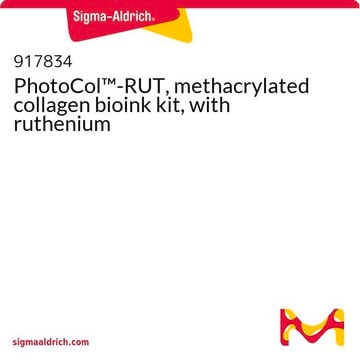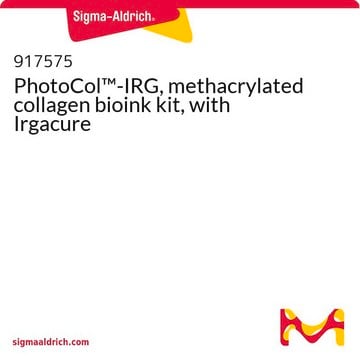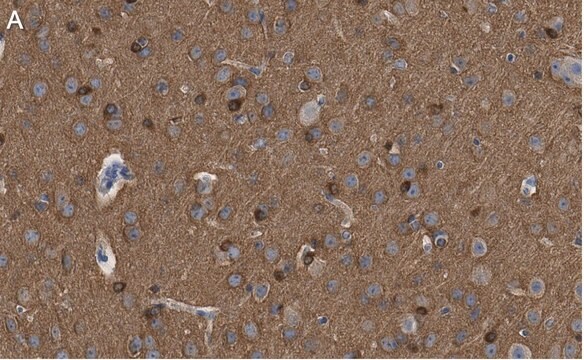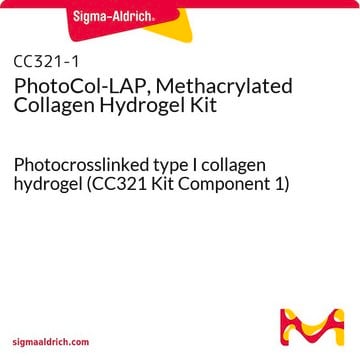Alle Fotos(1)
Wichtige Dokumente
916293
PhotoCol™-LAP
methacrylated collagen bioink kit, with LAP
Synonym(e):
3D Bioprinting, Bioink, Collagen
Anmeldenzur Ansicht organisationsspezifischer und vertraglich vereinbarter Preise
Alle Fotos(1)
About This Item
UNSPSC-Code:
12352201
NACRES:
NA.23
Empfohlene Produkte
Beschreibung
Methacrylated collagen:
Degree of methacrylation ≥ 20%
Product components :
Qualitätsniveau
Sterilität
sterile; sterile-filtered
Form
liquid
Verunreinigungen
≤10 EU/mL Endotoxin
Lagertemp.
2-8°C
Anwendung
PhotoCol™-LAP bioink kit consists of purified methacrylated Type I bovine collagen as the core component with other support reagents. The methacrylated Type I collagen is produced from telo-peptide intact bovine collagen where the collagen has been modified by reacting the free amines, primarily the ε-amines groups of the lysine residues as well as the a-amines groups on the N-termini. Over 20% of the total lysine residues of the collagen molecule have been methacrylated. A bottle of 20 mM acetic acid solution is provided to solubilize the lyophilized methacrylated collagen at concentrations ranging from 3 to 8 mg/ml. The neutralization solution consists of an alkaline 10X phosphate buffered saline (PBS) solution which provides physiological salts and pH in the final mixture. The photoinitiator consists of LAP to be formulated in 1X cell culture media or PBS, which allows blue light photocrosslinking of the printed structure at 405 nm. PhotoCol™-LAP provides native-like 3D collagen gels, and the final gel stiffness can be customized by changing collagen concentrations and crosslinking.
Rechtliche Hinweise
PhotoCol is a trademark of Advanced BioMatrix, Inc.
Lagerklassenschlüssel
10 - Combustible liquids
Hier finden Sie alle aktuellen Versionen:
Besitzen Sie dieses Produkt bereits?
In der Dokumentenbibliothek finden Sie die Dokumentation zu den Produkten, die Sie kürzlich erworben haben.
A New Approach to Design Artificial 3D Microniches with Combined Chemical, Topographical, and Rheological Cues.
Stoecklin, Celine, et al.
Advanced Biosystems, 1700237-1700237 (2018)
Kathryn E Drzewiecki et al.
Langmuir : the ACS journal of surfaces and colloids, 30(37), 11204-11211 (2014-09-11)
Type-I collagen self-assembles into a fibrillar gel at physiological temperature and pH to provide a cell-adhesive, supportive, structural network. As such, it is an attractive, popular scaffold for in vitro evaluations of cellular behavior and for tissue engineering applications. In
Erin Maloney et al.
Micromachines, 11(2) (2020-02-23)
The current drug development pipeline takes approximately fifteen years and $2.6 billion to get a new drug to market. Typically, drugs are tested on two-dimensional (2D) cell cultures and animal models to estimate their efficacy before reaching human trials. However
Ian D Gaudet et al.
Biointerphases, 7(1-4), 25-25 (2012-05-17)
Type-I collagen is an attractive scaffold material for tissue engineering due to its ability to self-assemble into a fibrillar hydrogel, its innate support of tissue cells through bioactive adhesion sites, and its biodegradability. However, a lack of control of material
Andrea Mazzocchi et al.
ACS biomaterials science & engineering, 5(4), 1937-1943 (2019-11-15)
Lung cancer is the leading cause of cancer-related death worldwide yet in vitro disease models have been limited to traditional 2D culture utilizing cancer cell lines. In contrast, recently developed 3D models (organoids) have been adopted by researchers to improve
Unser Team von Wissenschaftlern verfügt über Erfahrung in allen Forschungsbereichen einschließlich Life Science, Materialwissenschaften, chemischer Synthese, Chromatographie, Analytik und vielen mehr..
Setzen Sie sich mit dem technischen Dienst in Verbindung.







